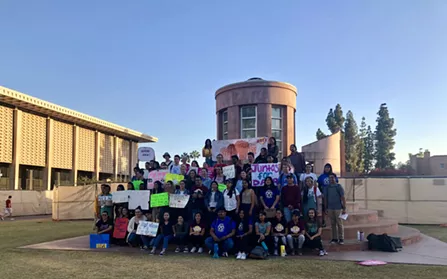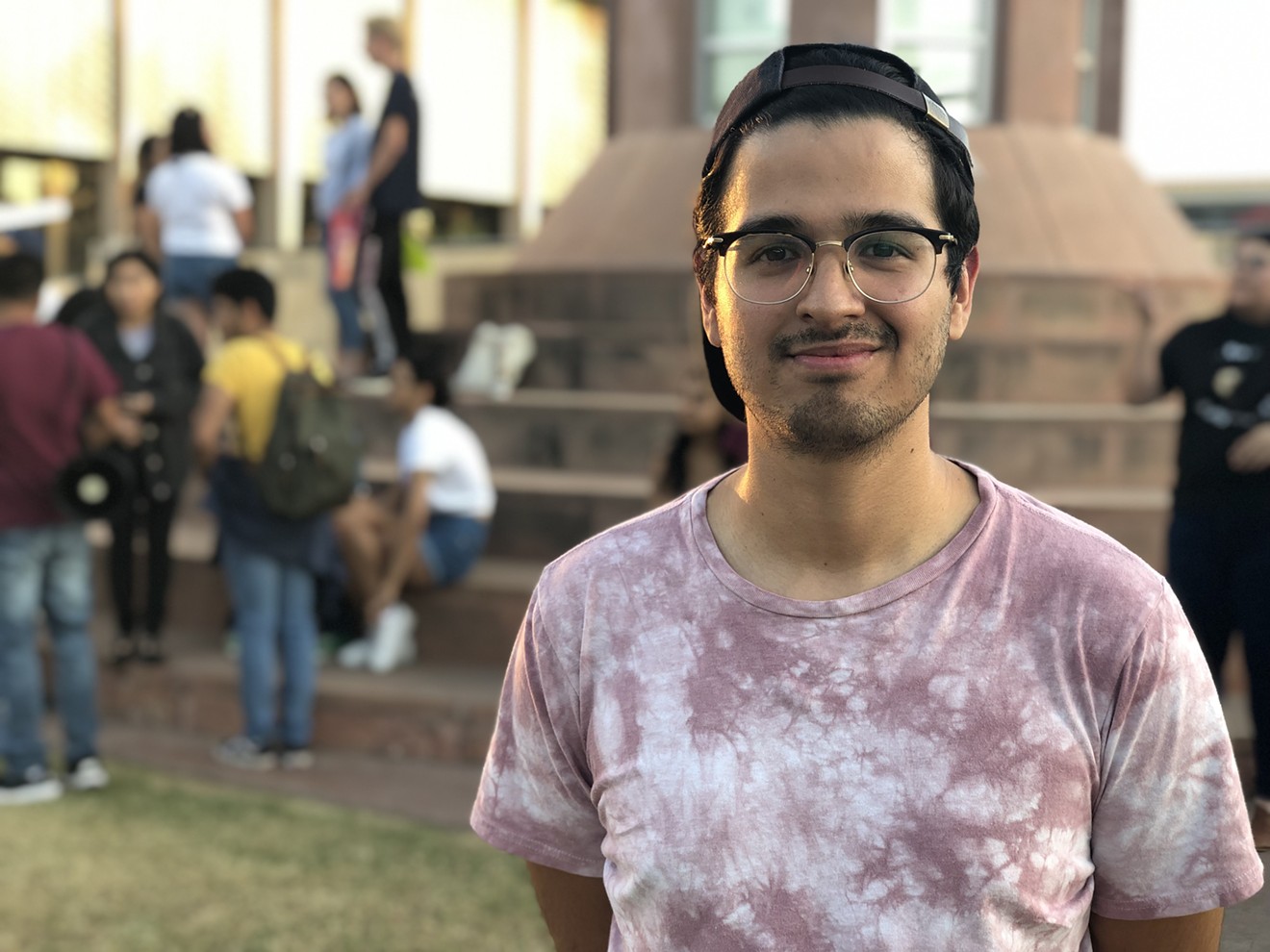As the U.S. Supreme Court heard arguments for allowing the Trump administration to end the Deferred Action for Childhood Arrivals program this week, Dreamer students at Arizona State University asked the student body to hear them – and not to forget about other undocumented students.
“We just want to be visible," said Mario Mosqueda, an ASU biomedical engineering student who came to the United States from Mexico when he was 6. "When you’re undocumented, or DACA, a lot of times you feel like you have to hide or be in the shadows. This event was mostly about introducing us – saying we’re here, this is our voice, would you join us?”
Around 40 students gathered on Hayden Lawn at ASU’s main campus on the afternoon of November 12 for a press conference held by Undocumented Students for Education Equity, an undocumented student group at ASU.
Four students who are current recipients of DACA shared stories of how their lives have been affected by the program.
“For years, I’ve been able to attend school without the fear of deportation,” Luis Zambrano, a journalism student who was brought to the country from Mexico when he was 1, said at the event. “When I got DACA in 2012, I didn’t realize how much of a burden I’d carried with my undocumented status. I could legally work now, and I had a sense of protection. Now, that’s been threatened.”
DACA, a program that temporarily prevents deportation of some 700,000 Dreamers, the term commonly used for undocumented people who came to the country while they were still minors. The Obama-era initiative that allows young people who were brought to the United States illegally as children to work and attend school if they meet certain requirements and have passed a background check. President Trump is seeking to permanently end the policy, which was passed by executive order, and his administration has already shut down new applications for Dreamers who were not already recipients.
Zambrano, who said he watched his uncle be deported after he was pulled over for a speeding ticket in Phoenix, said he was about to go into his first year at ASU when Trump first announced his intentions to end the DACA program in 2017. Without a chance of renewal, the protections would last halfway through his first semester.
“Legal actions and activism, protest bought us time,” Zambrano said, noting that he's had trouble sleeping as the Supreme Court hearing neared. “But now, we’re here today with the strong possibility that DACA recipients lose these protections. And today, I feel the same way I did back in 2017.”
ASU currently has 290 students who are undocumented, including its DACA recipients, according to Herminia Rincon, media relations officer at the university. Though the event was not organized by ASU, Herminia noted that ASU has staff available to answer questions from students about "where to find information about their legal rights."

Osman Erives, who's studying marketing, and Stephanie Robles, who's studying political science and communications, are ASU students and members of Undocumented Students for Equal Equity.
Hannah Critchfield
“The idea that DACA students have any sort of criminal record, that’s not true,” said Osman Erives, a marketing major and DACA recipient who also shared his story at the event. “DACA students go through a vigorous process every two years to make sure there’s nothing on you. All DACA students do is work and go to school.”
Undocumented Students for Education Equity (USEE) was founded after the 2016 election, and is led by undocumented students on campus, said Stephanie Robles, the group's chief of staff. The organization strives to create more resources for undocumented students on campus, including advocating for a new scholarship from the university, and build a network of support throughout their time at ASU. Robles said its founders, who have graduated, were among the several thousand Dreamers rallying outside the Supreme Court in support of DACA yesterday.
The speakers from USEE, which includes both DACA recipients and other students who are undocumented, said that regardless of what happens with the DACA program, there’s more work to do when it comes to immigration reform in the United States.
“We’re not just here for DACA recipients; we’re here for the whole undocumented community," Erives said. "We want to make sure that people know that we are part of a larger community that has been a part of this country for decades, but don’t have these protections. As grateful as we are for the DACA program, it’s very specific."
To participate in the current DACA program, an individual must have come to the United States before their 16th birthday, and must have been 31 or younger before the date then-President Barack Obama announced the program in 2012. They must not have committed a felony, serious misdemeanor, or more than two other misdemeanors. The program itself does not grant a path to citizenship, nor is there any current way for Dreamers to apply for citizenship while living in the United States.

Members of Undocumented Students for Equal Equity and other supportive students gathered for a photo after the press conference.
Hannah Critchfield
The event ended with the students gathered chanting in solidarity.
The Supreme Court could issue its decision as late as June 2020, meaning DACA will remain a major issue in the upcoming presidential campaign. The student group said it will continue in its advocacy by encouraging other students to vote.
“As we finish this year and go into 2020, we will have to do this time and time again, to put pressure on our representatives to recognize us,” Zambrano said at the end of his speech. “So, I ask you to continue to fight for the many individuals who through DACA did amazing things that they did not think previously possible.”











